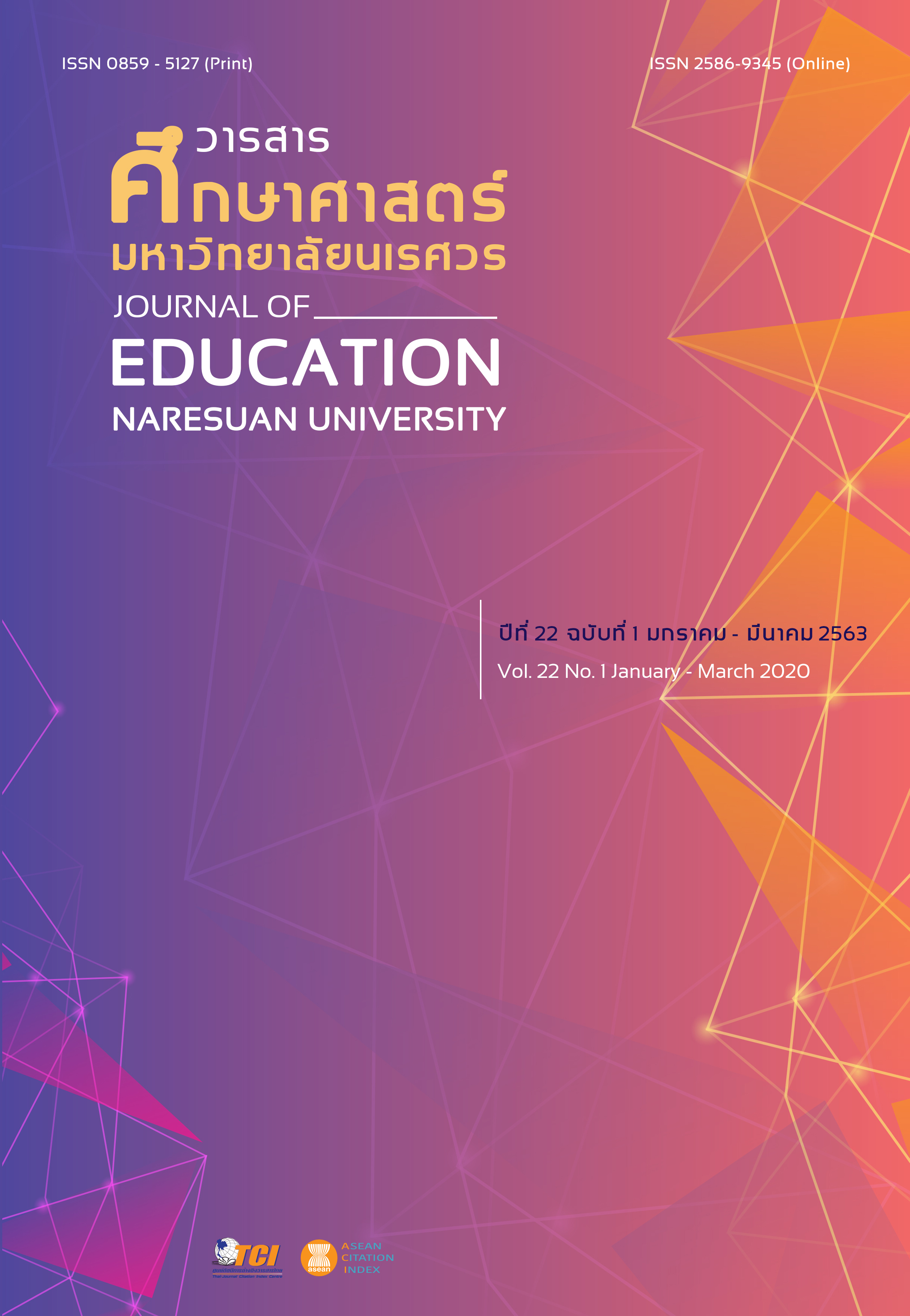THE DEVELOPMENT OF E-LEANING MODEL BY COLLABORATIVE LEARNING ON SOCIAL MEDIA TO DEVELOP INFORMATION LITERACY SKILLS FOR UNDERGRADUATE STUDENTS OF FACULTY OF EDUCATION
Main Article Content
Abstract
The purposes of this research were to develop e-learning model by collaborative learning on social media to develop information literacy skill for undergraduate students of Educational Faculty and to study the results of the model usage. The results of the study were as follows:
1. The e-learning model by collaborative learning on social media to develop information literacy skill consisted of 4 major components; 1) the students preparing, 2) learning activities, 3) students’ interaction, 4) students’ knowledge transfer. There were 6 steps of teaching and learning activities; 1) e-learning orientation/introduction, 2) accessing e-learning lessons, 3) learning on e-learning contents, 4) learning activities, [which were divided into; 4.1) accessing for creating motivation, 4.2) building social interaction, 4.3) exchanging information and knowledge, 4.4) constructing new knowledge, and 4.5) developing knowledge], 5) interacting through social on-line learning, and 6) measuring and evaluating the students’ learning.
2. The result of trying out the e-learning model with collaborative learning on social media to develop the information literacy skills was at a good level ( = 4.08). The evaluation of the students’ assignments was higher than criteria (60 %) in all products (82.13 %). The assessment of the students' information literacy skills was also at a high level (
= 4.15).
Article Details
The owner of the article does not copy or violate any of its copyright. If any copyright infringement occurs or prosecution, in any case, the Editorial Board is not involved in all the rights to the owner of the article to be performed.
References
Abby Kasowitz-Scheer, & Michael Pasqualoni. (2002). Information literacy instruction in higher education mends and issues. Retrieved from https://surface.syr.edu/cgi/viewcontent.cgi?article=1032&context=sul
Ally, M. (2006). Foundations of Educational Theory for Online Learning. In Terry Anderson, Theories of Practice of Online Learning. Athabasca University, The center for Distance Education.
Cabinet Secretariat. (2014). The cabinet's policy statement. Gen. Prayut Chan-o-cha Prime Minister told the National Assembly. September 12, 2557. [in Thai]
Commission on Higher Education. (2009). Board of education's guidelines for higher education qualifications framework Act B.E. 2552. Bangkok: Commission on Higher Education. [in Thai]
Eisenberg, M., & Berkowitz, B. (2001). The big 6: An information problem-solving process. Retrieved from https://www.big6.com
Hongto, W. (2010). The development of an online learning community model using knowledge creation process to create instructional innovation of computer teachers (Doctoral dissertation): Bangkok: Silpakorn University. [in Thai]
Khlaisang, J. (2012). Design courseware for e-Learning: From concept to practice. Bangkok: Chulalongkorn University. [in Thai]
Ministry of Education. (2011). Attachment to the Ministry of Education's undergraduate qualification standards. Branch of Education and Educational Program (5 years). Bangkok: Ministry of Education. [in Thai]
Moore, M., & Kearsley. (2005). Distance education: A systems view. Belmont, Calif.: Thomson/ Wadsworth.
Natewong, T. (2010). Development of a mainstreaming model to develop online learning community and learning achievement in information technology for undergraduate students (Doctoral dissertation). Bangkok: Chulalongkorn University. [in Thai]
Office of the Education Council. (2012). Developed a feature to a new era for education reform in the second decade with the integration of ICT in the learning program. Bangkok: Office of the Education Council Ministry of Education. [in Thai]
Rhodes, J. (2008). Improving youth mentoring through research-based practice. American Journal of Community Psychology, 41(1-2), 35-42.
Sinthaworn, V. (2010). Development of a cooperative blended learning model using resource-based learning to enhance information literacy and team learning skills for Rajabhat University preservice teachers (Doctoral dissertation). Bangkok: Chulalongkorn University. [in Thai]
Thammetar, T. (2014). E-learning: From theory to practice. Bangkok: Thai Cyber University Project, the Commission on Higher Education. [in Thai]


